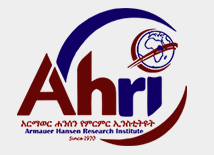
BY ALAZAR SHIFERAW
Armauer Hansen Research Institute (AHRI), the Biomedical and Clinical Research wing of the Ministry of Health, is working towards significantly reducing the treatment period of Multi-drug Resistant Tuberculosis (MDR-TB) and developing in-house test kits for COVID 19 in Ethiopia.
In a recent exclusive interview with the Ethiopian Herald, AHRI Director General Dr.Abebe Genetu said the biomedical and clinical researches have focused on drug discovery , drug effectiveness study , vaccine discovery and vaccines effectiveness studies.
The studies as well focus on understanding the pathogenesis of diseases. The Institute has also been engaged in understanding the nature of the infectious diseases in Ethiopia that can improve the clinical management of diseases.
In addition, the institute is also involved in training to support post-graduate education in Ethiopia. Presently, AHRI has 48 PhD and 11 masters students, the director general said.
On top of the research and training, AHRI is also involved in rendering selective diagnostic services which are not given by other institutions in Ethiopia. AHRI right now is organized into two deputy Director General offices: Deputy Director General for Research and Innovation and Deputy Director General for Administration and Development.
Under research and Innovation, AHRI is currently running close to 120 active research projects that are teamed up in five directorates: Tuberculosis (TB) and leprosy research, bacterial and viral diseases research, malaria and neglected tropical diseases research, clinical trial research, and Biotechnology and Bioinformatics research directorates.
In addition to generating evidence, the institute is also working, through the Knowledge Management Directorate, in translating research data to change policy and practice. Since 2016, it has produced Policy briefs, some of which resulted in policy and practice change at the national and international scale.
AHRI is conducting researches to test new or improved tools, drugs , and Vaccines in Ethiopia as well. Currently ,AHRI is conducting a clinical trial on new drugs for COVID 19 treatment that is coordinated by the World Health Organization (WHO) through an initiative : “Solidarity trial” .
This trial aims at testing the effectiveness and safety of new and existing drugs for the treatment of COVID-19. This clinical trial is being conducted in over 30 countries worldwide. Ethiopia is the third country next to South Africa and Egypt in conducting the WHO solidarity trial.
Basically, the research projects that are conducted at the Institute can be classified into two broad categories. The first type is Basic science research. Here, the research focuses on understanding disease and disease causing germs to eventually produce new drugs, vaccines and diagnostics.
The second trype: translational science research. It involves generating evidence to develop new policies and/or to change current practices in patient care. “We have different research projects which support the MoH and WHO to change their policies and practices.”
One best example is the clinical trial that AHRI completed two years ago. The trial was to test the effectiveness of different combinations of existing drugs to treat MDR-TB.
As a result of the trial and the evidence generated, the treatment period of MDR-TB has been reduced from 18 to 24 months to only nine months. This trial was a multinational and multi-institutional project where AHRI collaborated with St. Peter’s Hospital in Ethiopia.
As a result of the trial, both WHO and Ethiopian MoH have changed the treatment guideline of MDR-TB. This has a huge positive implication in improving the treatment outcome and patient adherence to the treatment. In addition, it improves the cost-effectiveness of the treatment as it significantly reduces hospital stay, he said.
Right now, AHRI is conducting the second phase of the project aiming at further reducing the treatment time to four months and injectable free. “We do not want to have injectable for four months.” The first treatment was a combination of injectable and tablets for 24 months. Now reduced to nine months only. “Right now we are aiming to further reduce the treatment time into four month and using only tablets.”
AHRI is also working on COVID 19: laboratory testing and research. Dr.Abebe further said, right from the first day that COVID -19 was reported in Ethiopia, the institute identified the areas that the institute could contribute to tackle the pandemic.
The first thing that AHRI did was to remodel one of its laboratories to start testing COVID – 19. It was the second laboratory next to EPHI to establish COVID- 19 testing laboratory. AHRI has done more than 70 thousand tests since March 2020.
Because AHRI has all the experts including virologists, laboratory personnel, equipment and reagents, it was not difficult to establish testing labs. AHRI has also conducted a study to improve the effectiveness of COVID-19 testing in Ethiopia. “We did a small research project that helps to increase the effectiveness of testing. ” “ AHRI has developed and validated a “Sample
Pooling” method that resulted saving more than 25,000 test kits at AHRI alone.” AHRI also believes that it may have saved 100,000 test kits for the country, he said .
AHRI has also supported other laboratories to establish their COVID- 19 testing laboratories. Together with EPHI, it has supported institutions in the country by providing expert support and also laboratory materials and some reagents .
Importantly, AHRI has developed a testing kit that detects the people’s exposure to COVID-19. This is useful for surveillance purposes. Because of the limitation in testing capacity, “We may not know the true extent of the disease in Ethiopia.”
The Serological test helps us to understand the proportion of the population who have been exposed to the virus. The serological test uses blood to detect circulating antibodies produced against the COVID-19 virus. This test kit will soon be rolled-out to conduct national survey to understand the extent of COVID-19 infection in Ethiopia.
The project has been done in collaboration with Dr. Fekadu Tafesse, an Ethiopian diaspora professor at Oregon Health and Science University, USA .Right now, AHRI has completed the validation work and has applied to the Ethiopian Food and Drug Authority for emergency approval. If that goes as planned, Ethiopia will have its own serological test kit.
AHRI was established in 1970 by the government of Ethiopia, Sweden and Norway as a leprosy research institute. In 2016, it was re-established by The Council of Ministers (Reg. No. 376/2016) as a Biomedical and Clinical Research government institute under the Ministry of Health, he said.
The Ethiopian Herald February 26/2021


